Periodontal (Gum) Disease
Temecula, CA
Periodontal Disease Information provided by Dr. Vinh Le
and Dr. Quang Le
in Temecula, CA at Picasso Dental Care
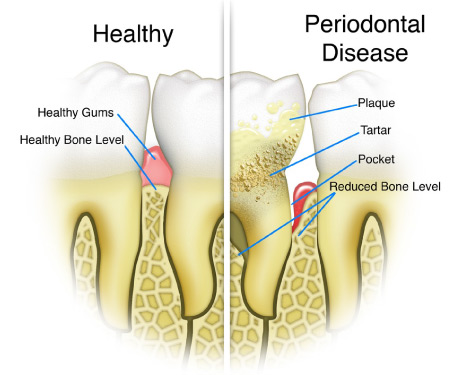 A recent literature review article has showed the strong connection between gum infection (periodontal disease) to other systemic diseases. Below, we'll explain some common links between bleeding gums and overall health. A recent literature review article has showed the strong connection between gum infection (periodontal disease) to other systemic diseases. Below, we'll explain some common links between bleeding gums and overall health.
Periodontal disease is the infection of the gum, teeth, and bone that surround teeth. Current estimates show that 75% of the North American population have some form of gum infection (Friedewald et al.). Normally, these are a low-grade chronic infections, which don't show any signs and symptoms other than occasional gum bleeding while brushing and flossing. Due to lack of symptoms, gum infection is usually undiagnosed or untreated.
A chronic inflammation response of the gum and bone surrounding the teeth causes the total body inflammation response to increase overall. This heightened inflammatory response contributes directly to worsening of systemic diseases which are caused by inflammation, such as rheumatoid arthritis, osteoporosis, and pneumonia.
Inflammation factors also cause dislodging of fatty deposits in the blood vessel. These dislodged fatty deposits will travel through the blood system, which could block a blood vessel at the heart causing a heart attack or block a blood vessel in the brain causing a stroke.
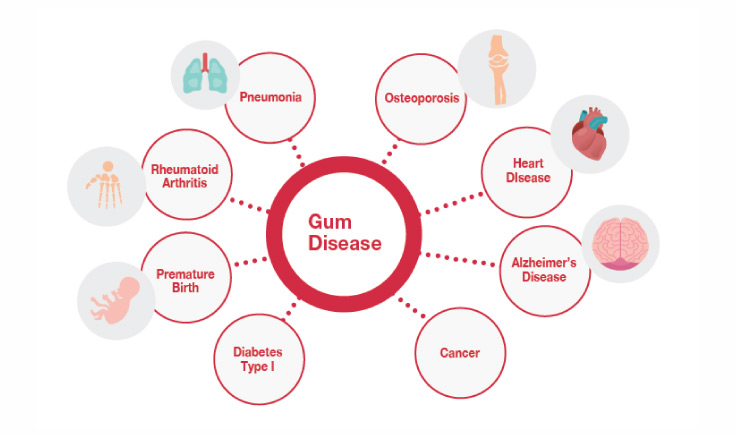
Periodontal Disease and Alzheimer's disease
There is evidence that periodontal disease may be a risk factor for dementia through the bacterial and viral infections commonly found in periodontal disease. Oral infection can either directly or through systemic signals to the brain contribute to the development of Alzheimer's disease (Watts, A.; Crimmin, E.M.; Gatz.M.).
Periodontal Disease and Cancer
Periodontal Disease also has a strong link to several type of cancer such as oral cancer, Upper GI and gastric cancers, Pancreatic Cancer, Lung cancer, and Esophageal cancer (Comlan Missih, DDS, MPH).
Periodontal Disease and Diabetes
The association between diabetes and inflammatory periodontal diseases has been studied extensively for more than 50 years. Large evidence research shows that diabetes is associated with the increase in gum infection. Also periodontal disease can also adversely affect the metabolic control of diabetes. Patients with diabetes who have periodontal disease have two chronic conditions, each of which may affect the other, and both of which require frequent professional evaluations by health care providers (Mealey BL.).
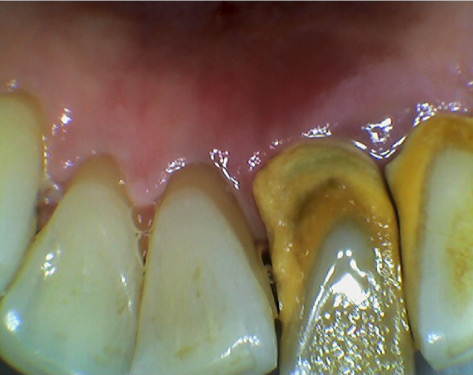 Periodontal Disease and Premature Birth
The oral cavity works as a continuous source of infectious agents, and its condition often reflects progression of systemic pathologies. Periodontal infection happens to serve as a bacterial reservoir that may exacerbate systemic diseases. Research suggests that the bacteria that cause inflammation in the gums can actually get into the bloodstream and target the fetus, potentially leading to premature labor and low-birth-weight babies (Saini R, Saini S, Saini SR.)
The common links of all these systemic diseases to gum infection are bacteria in the blood and inflammation factors that produce by-chromic infection on the gum and teeth. The consequences of untreated gum infection often time would lead to serious health implications and the loss of multiple teeth.
Scheduling a periodontal evaluation with Dr. Vinh Le or Dr. Quang Le is the first step to fight this silent deadly disease!
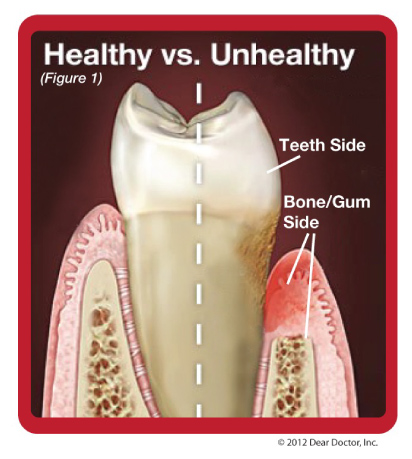
Now that we have cited many scientific studies to show the link between gum infection and systemic diseases, we will discuss deep cleaning periodontal treatment (scaling and root planing), periodontal maintenance, and prevention of gum infection.
Periodontal Treatment: Scaling and Root Planing
The primary goal of periodontal treatment is to clear infection from the gum and teeth. Periodontal infection is a chronic and non-curable bacterial infection. This traditional deep cleaning technique cleans the pockets forming between the gum and teeth due to infection.
The infected periodontal pockets have two walls: teeth side and bone - gum side. The deep cleaning treatment utilizes scalers to physically scale and clean the teeth side of the infected pocket. However, bacteria also penetrates and destroys the gum and bones surrounding the infected teeth.
Adjunct treatments such as medication and laser help to reduce and remove infection in the gum and bone side. The idea here is to create two clean sides (tooth side and gum side) to ensure no bacteria is trapped in the healing phase.
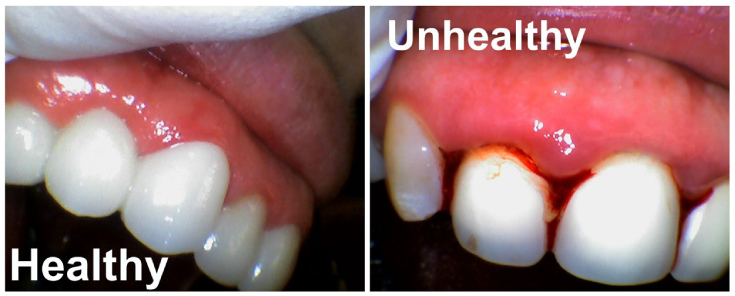 Periodontal Maintenance
Periodontal maintenance is designed to help patients with a history of gum infection. The general rule is, if you already have a history of gum infection, which causes the change of bone level supporting your teeth, then you need to get cleanings more often.
During routine home care with the proper cleaning technique, patients can clean up to 3 mm below the gum line. If you had gum infection in the past, most like you would have some areas of the gum that are deeper than 3 mm due to the history of bone loss. These areas need to be cleaned out by the hygienist with special tools.
Periodontal (Gum) Disease FAQ's
How is periodontal disease diagnosed?
A dentist can diagnose periodontal disease through an examination of your gums and teeth, measuring the pocket depth of the spaces between the teeth and gums, and taking X-rays to check for bone loss. Regular dental check-ups are essential for early detection and treatment.
How can I prevent periodontal disease?
You can prevent periodontal disease by maintaining good oral hygiene, which includes brushing your teeth at least twice a day, flossing daily, using an antimicrobial mouthwash, and visiting your dentist regularly for cleanings and check-ups. A healthy diet and avoiding tobacco products also help in preventing gum disease.
Are there any risk factors for developing periodontal disease?
Yes, several risk factors can increase your chances of developing periodontal disease. These include smoking, poor oral hygiene, genetics, certain illnesses like diabetes, medications that reduce saliva flow, hormonal changes in women, and poor nutrition.
Can periodontal disease affect my overall health?
Yes, periodontal disease has been linked to several serious health conditions, including heart disease, stroke, diabetes, respiratory disease, and complications during pregnancy. Maintaining good oral health can help reduce the risk of these systemic conditions.
How often should I visit the dentist if I have periodontal disease?
If you have periodontal disease, you may need to visit your dentist more frequently than the standard bi-annual check-ups. Your dentist will recommend a personalized schedule based on the severity of your condition, which may include visits every 3-4 months to manage the disease effectively.
Is periodontal treatment covered by insurance?
Many dental insurance plans cover at least a portion of periodontal treatment. However, the extent of coverage can vary widely. It’s important to check with your insurance provider to understand what specific treatments are covered under your plan.
What should I do if my periodontal disease is not improving?
If your periodontal disease is not improving despite treatment, it’s important to consult your dentist. There may be other underlying issues that need to be addressed, or your treatment plan may need to be adjusted. In some cases, seeing a specialist, such as a periodontist, may be necessary.
What is scaling and root planing?
Scaling and root planing is a deep cleaning procedure used to treat periodontal disease. Scaling involves removing plaque and tartar from the tooth surfaces and below the gum line. Root planing smooths the root surfaces, helping the gums reattach to the teeth and reducing inflammation.
Is scaling and root planing painful?
Scaling and root planing can cause some discomfort, but local anesthesia is usually used to numb the areas being treated. After the procedure, you may experience some sensitivity and discomfort, which can typically be managed with over-the-counter pain relievers and proper oral care.
How long does it take to recover from scaling and root planing?
Recovery from scaling and root planing usually takes a few days to a week. During this time, you may experience some gum tenderness and sensitivity to temperature. Maintaining good oral hygiene and following your dentist's post-procedure instructions can help ensure a smooth recovery.
References:
| 1. |
Friedewald et al. Editors Consensus: Periodontitis and atherosclerotic cardiovascular disease. Am J Cardiol? 104:59-68, 2009. Published simultaneously in the Journal of Periodontology. July, 2009.
|
| 2. |
Watts, A.; Crimmin, E.M.; Gatz.M.: Inflammation as a potential mediator for the association between periodontal disease and Alzheimer’s disease. Neuropsychiatric Disease and Treatment. 4(5):865-876, 2008.
|
| 3. |
Comlan Missih, DDS, MPH: The link between periodontal disease and cancer: A review. Perio-Implant Advisory website.
|
| 4. |
Mealey BL. J Am Dent Assoc. 2006 Oct;137 Suppl:26S-31S. Review. Erratum in: J Am Dent Assoc. 2008 Mar;139(3):252.
|
| 5. |
Saini R, Saini S, Saini SR. Periodontitis: A risk for delivery of premature labor and low-birth-weight infants. J Nat Sci Biol Med. 2010 Jul;1(1):40-2. |
|

 A recent literature review article has showed the strong connection between gum infection (periodontal disease) to other systemic diseases. Below, we'll explain some common links between bleeding gums and overall health.
A recent literature review article has showed the strong connection between gum infection (periodontal disease) to other systemic diseases. Below, we'll explain some common links between bleeding gums and overall health.


